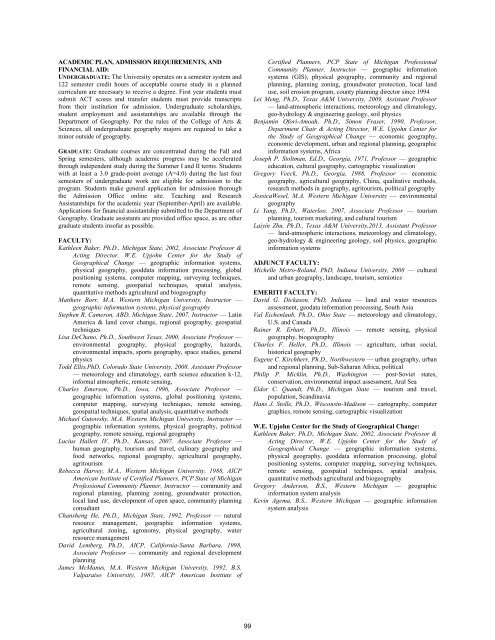AAG
20152016_Guide_to_Geography_Programs_in_the_Americas
20152016_Guide_to_Geography_Programs_in_the_Americas
You also want an ePaper? Increase the reach of your titles
YUMPU automatically turns print PDFs into web optimized ePapers that Google loves.
ACADEMIC PLAN, ADMISSION REQUIREMENTS, AND<br />
FINANCIAL AID:<br />
UNDERGRADUATE: The University operates on a semester system and<br />
122 semester credit hours of acceptable course study in a planned<br />
curriculum are necessary to receive a degree. First year students must<br />
submit ACT scores and transfer students must provide transcripts<br />
from their institution for admission. Undergraduate scholarships,<br />
student employment and assistantships are available through the<br />
Department of Geography. Per the rules of the College of Arts &<br />
Sciences, all undergraduate geography majors are required to take a<br />
minor outside of geography.<br />
GRADUATE: Graduate courses are concentrated during the Fall and<br />
Spring semesters, although academic progress may be accelerated<br />
through independent study during the Summer I and II terms. Students<br />
with at least a 3.0 grade-point average (A=4.0) during the last four<br />
semesters of undergraduate work are eligible for admission to the<br />
program. Students make general application for admission thorough<br />
the Admission Office online site. Teaching and Research<br />
Assistantships for the academic year (September-April) are available.<br />
Applications for financial assistantship submitted to the Department of<br />
Geography. Graduate assistants are provided office space, as are other<br />
graduate students insofar as possible.<br />
FACULTY:<br />
Kathleen Baker, Ph.D., Michigan State, 2002, Associate Professor &<br />
Acting Director, W.E. Upjohn Center for the Study of<br />
Geographical Change — geographic information systems,<br />
physical geography, geoddata information processing, global<br />
positioning systems, computer mapping, surveying techniques,<br />
remote sensing, geospatial techniques, spatial analysis,<br />
quantitative methods agricultural and biogeography<br />
Matthew Borr, M.A. Western Michigan University, Instructor —<br />
geographic information systems, physical geography<br />
Stephen R. Cameron, ABD, Michigan State, 2007, Instructor — Latin<br />
America & land cover change, regional geography, geospatial<br />
techniques<br />
Lisa DeChano, Ph.D., Southwest Texas, 2000, Associate Professor —<br />
environmental geography, physical geography, hazards,<br />
environmental impacts, sports geography, space studies, general<br />
physics<br />
Todd Ellis,PhD, Colorado State University, 2008, Assistant Professor<br />
— meteorology and climatology, earth science education k-12,<br />
informal atmospheric, remote sensing,<br />
Charles Emerson, Ph.D., Iowa, 1996, Associate Professor —<br />
geographic information systems, global positioning systems,<br />
computer mapping, surveying techniques, remote sensing,<br />
geospatial techniques, spatial analysis, quantitative methods<br />
Michael Gutowsky, M.A. Western Michigan University, Instructor —<br />
geographic information systems, physical geography, political<br />
geography, remote sensing, regional geography<br />
Lucius Hallett IV, Ph.D., Kansas, 2007. Associate Professor —<br />
human geography, tourism and travel, culinary geography and<br />
food networks, regional geography, agricultural geography,<br />
agritourism<br />
Rebecca Harvey, M.A., Western Michigan University, 1988, AICP<br />
American Institute of Certified Planners, PCP State of Michigan<br />
Professional Community Planner, Instructor — community and<br />
regional planning, planning zoning, groundwater protection,<br />
local land use, development of open space, community planning<br />
consultant<br />
Chansheng He, Ph.D., Michigan State, 1992, Professor — natural<br />
resource management, geographic information systems,<br />
agricultural zoning, agronomy, physical geography, water<br />
resource management<br />
David Lemberg, Ph.D., AICP, California-Santa Barbara, 1998,<br />
Associate Professor — community and regional development<br />
planning<br />
James McManus, M.A. Western Michigan University, 1992, B.S.<br />
Valparaiso University, 1987, AICP American Institute of<br />
Certified Planners, PCP State of Michigan Professional<br />
Community Planner, Instructor — geographic information<br />
systems (GIS), physical geography, community and regional<br />
planning, planning zoning, groundwater protection, local land<br />
use, soil erosion program, county planning director since 1994<br />
Lei Meng, Ph.D., Texas A&M University, 2009, Assistant Professor<br />
— land-atmospheric interactions, meteorology and climatology,<br />
geo-hydrology & engineering geology, soil physics<br />
Benjamin Ofori-Amoah, Ph.D., Simon Fraser, 1990, Professor,<br />
Department Chair & Acting Director, W.E. Upjohn Center for<br />
the Study of Geographical Change — economic geography,<br />
economic development, urban and regional planning, geographic<br />
information systems, Africa<br />
Joseph P. Stoltman, Ed.D., Georgia, 1971, Professor — geographic<br />
education, cultural geography, cartographic visualization<br />
Gregory Veeck, Ph.D., Georgia, 1988, Professor — economic<br />
geography, agricultural geography, China, qualitative methods,<br />
research methods in geography, agritourism, political geography<br />
JessicaWesel, M.A. Western Michigan University — environmental<br />
geography<br />
Li Yang, Ph.D., Waterloo, 2007, Associate Professor — tourism<br />
planning, tourism marketing, and cultural tourism<br />
Laiyin Zhu, Ph.D., Texas A&M University,2013, Assistant Professor<br />
— land-atmospheric interactions, meteorology and climatology,<br />
geo-hydrology & engineering geology, soil physics, geographic<br />
information systems<br />
ADJUNCT FACULTY:<br />
Michelle Metro-Roland, PhD, Indiana University, 2008 — cultural<br />
and urban geography, landscape, tourism, semiotics<br />
EMERITI FACULTY:<br />
David G. Dickason, PhD, Indiana — land and water resources<br />
assessment, geodata information processing, South Asia<br />
Val Eichenlaub, Ph.D., Ohio State — meteorology and climatology,<br />
U.S. and Canada<br />
Rainer R. Erhart, Ph.D., Illinois — remote sensing, physical<br />
geography, biogeography<br />
Charles F. Heller, Ph.D., Illinois — agriculture, urban social,<br />
historical geography<br />
Eugene C. Kirchherr, Ph.D., Northwestern — urban geography, urban<br />
and regional planning, Sub-Saharan Africa, political<br />
Philip P. Micklin, Ph.D., Washington — post-Soviet states,<br />
conservation, environmental impact assessment, Aral Sea<br />
Eldor C. Quandt, Ph.D., Michigan State — tourism and travel,<br />
population, Scandinavia<br />
Hans J. Stolle, Ph.D., Wisconsin-Madison — cartography, computer<br />
graphics, remote sensing, cartographic visualization<br />
W.E. Upjohn Center for the Study of Geographical Change:<br />
Kathleen Baker, Ph.D., Michigan State, 2002, Associate Professor &<br />
Acting Director, W.E. Upjohn Center for the Study of<br />
Geographical Change — geographic information systems,<br />
physical geography, geoddata information processing, global<br />
positioning systems, computer mapping, surveying techniques,<br />
remote sensing, geospatial techniques, spatial analysis,<br />
quantitative methods agricultural and biogeography<br />
Gregory Anderson, B.S., Western Michigan — geographic<br />
information system analysis<br />
Kevin Agema, B.S., Western Michigan — geographic information<br />
system analysis<br />
99


